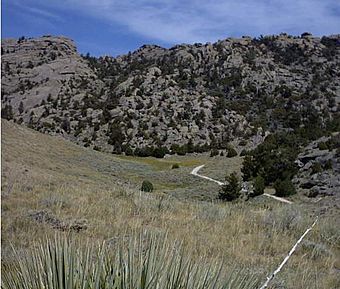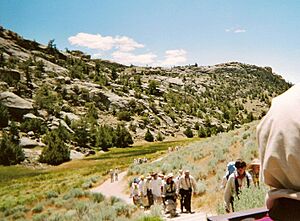Martin's Cove facts for kids
Quick facts for kids |
|
|
Martin's Cove
|
|

Martin's Cove, Wyoming
|
|
| Location | Southwest of Casper, Wyoming, US |
|---|---|
| Nearest city | Alcova, Wyoming, US |
| Visitation | 100,000+ (2005) |
| NRHP reference No. | 77001383 |
| Added to NRHP | March 8, 1977 |
Martin's Cove is a special historical place in Wyoming. It covers about 933 acres (3.8 square kilometers). You can find it about 55 miles (89 kilometers) southwest of Casper, Wyoming. This important site is part of the famous Mormon Trail. It also sits on a section of the Oregon Trail, near the North Platte and Sweetwater rivers. Martin's Cove was officially recognized as a historic place on March 8, 1977. It is now listed on the National Register of Historic Places.
Contents
A Difficult Journey: The Martin Handcart Company
Before railroads crossed the country, many people traveled long distances. About 70,000 members of the Church of Jesus Christ of Latter-day Saints (LDS Church) traveled the Mormon Trail. Sadly, almost 6,000 of them died along the way.
In November 1856, a group called the Martin Handcart Company faced a terrible challenge. About 600 people were traveling to Salt Lake City using handcarts. These carts were pulled by hand, carrying all their belongings. They started their journey very late in the year, on July 28, 1856. This late start made their trip very dangerous.
Trapped by Snow and Cold
As they traveled, heavy snow and freezing cold stopped them at Martin's Cove. They were stuck there for five days. Before reaching the cove, a small rescue team met them. This team brought food, supplies, and wagons. Brigham Young, the church president, had sent them from Salt Lake City.
On November 4, the company and rescuers crossed the very cold Sweetwater River. They found shelter in the cove. That night, a strong north wind blew their tents down. They set the tents up again, but a blizzard brought even more snow. The company could not move for five days because of the snow and cold. Many of their cattle died and froze.
Reaching Safety in Salt Lake City
When the weather finally warmed on November 9, the company could move on. With help from the first rescue team and others who joined them, the survivors kept going. They finally reached Salt Lake City on November 30. More than 145 members of the Martin Company died before reaching their destination.
Later, many other travelers passed by the cove. They were heading to Utah, California, and Oregon. Pony Express riders also used this route. In the 1870s, a frontiersman named Tom Sun bought the land. He started the Tom Sun Ranch there.
Who Owns and Manages Martin's Cove?
In the 1990s, the LDS Church bought the nearby Sun Ranch. They then tried to buy Martin's Cove itself. They wanted to run it as a historic site. In 2002, a bill to sell the land passed in the House of Representatives. However, it stopped in the Senate. Some people worried about selling public land to a religious group.
Working with the Government
These concerns were partly because the land included areas used by many different travelers. These included emigrant trains and the Pony Express. Other important landmarks like Devil's Gate were also there. So, the Bureau of Land Management (BLM) had to find another solution. The BLM is part of the U.S. government's Interior Department. They negotiated a long-term lease with the church.
This lease was signed in 2004. It allowed the church to manage and care for the property for 25 years.
Rules for Visitors
In 2006, a lawsuit by the American Civil Liberties Union changed how the site is managed. The BLM had to remove religious references from the site. The church also had to provide a public entrance to the cove. This entrance had to be separate from their Visitors' Center. Volunteers from the church at the site were also given new rules. They were asked to simply answer questions. They could not approach visitors in a way that might seem like they were trying to convert them.
Visiting Martin's Cove Today
About 100,000 people visit Martin's Cove every year. Most of these visitors are members of the LDS Church. Each year, thousands of young people from the church take part in "Handcart Treks."
Experience a Handcart Trek
These Treks involve dressing in old-fashioned clothes. Participants spend several days pulling handcarts. They also camp out along the Mormon Trail. A highlight of their Trek is visiting Martin's Cove. They also see nearby Devil's Gate and the LDS Visitors' Center. It's a way to experience a small part of history.
See also


